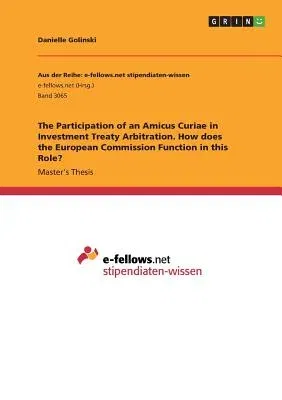Master's Thesis from the year 2018 in the subject Law - Civil / Private,
Trade, Anti Trust Law, Business Law, grade: 1,3, Stellenbosch
Universitiy, language: English, abstract: This research paper will
examine the current development of amicus curiae participation in
investment arbitration and the functioning of the European Commission in
this role. The need for transparency and reforms in international
investment arbitration will be examined and it will be critically
evaluated whether amicus participation is a suitable tool for addressing
legitimacy concerns. The role of an amicus curiae in current arbitration
practice will be examined as well. Various arbitration regimes and their
approach to amicus participation will be evaluated. The last part of the
paper will concentrate on the role of the European Commission and will
examine the Commission's role as an amicus in investment disputes in
practice. Within our global economy, international investments are a
cornerstone. In the modern era, the favoured dispute resolution
mechanism has been investment arbitration, a distinct form of
international commercial arbitration, which has increased dramatically.
Today, investors usually submit claims after consultations and
negotiations with the host state for resolution under the auspices of an
arbitral institution. Similarly, a new trend in structuring and
supporting investments is the proliferation of regional arrangements in
the form of Free Trade Agreements, like the North American Free Trade
Agreement (NAFTA), the Comprehensive Economic and Trade Agreement
between Canada and the EU (CETA) or the multi-party Energy Charter
Treaty (ECT). As investment arbitration has gained more presence within
the international judicial landscape, it has also been put under the
scrutiny of public society. Especially during the CETA and the TTIP
negotiations, a growing public concern within Europe evolved,
manifesting the belief that international investment arbitration is a
threat


